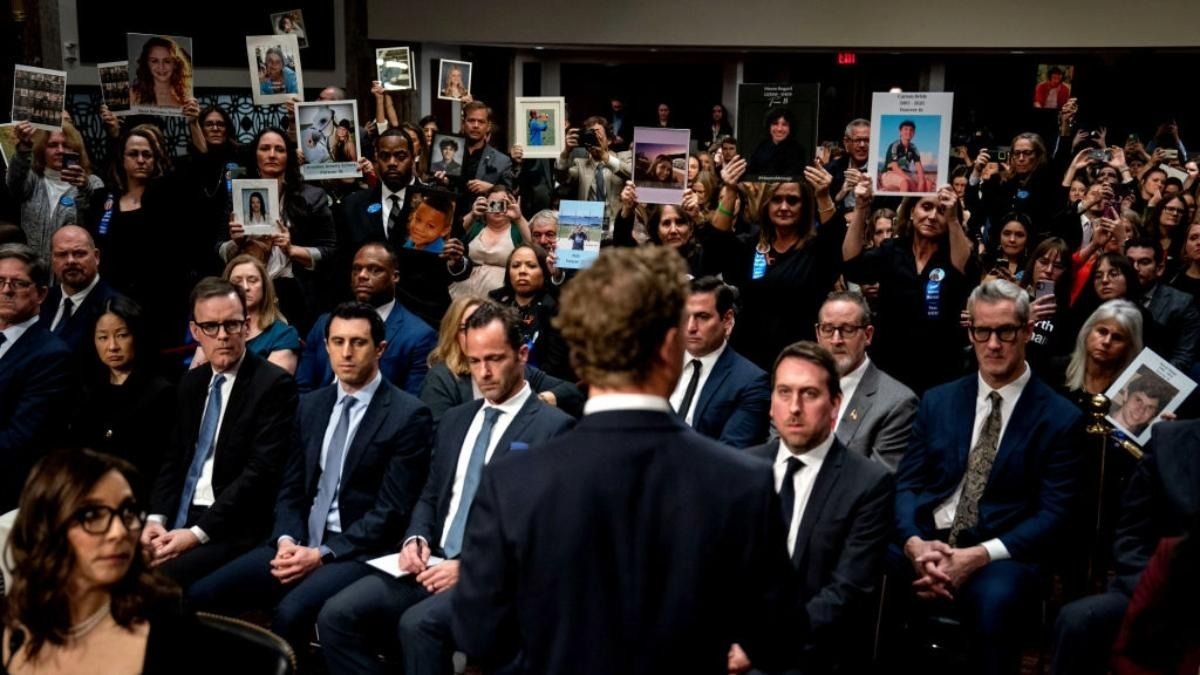On Facebook’s 20th Anniversary, Image of Zuckerberg Apology in the US Senate Will Endure
Justin Hendrix / Feb 4, 2024
Mark Zuckerberg, CEO of Meta Platforms Inc., center right, addresses the audience, including parents of children injured or lost in events involving social media, during a Senate Judiciary Committee hearing in Washington, DC, US, on Wednesday, Jan. 31, 2024. Photographer: Kent Nishimura/Bloomberg via Getty Images
On February 4, 2004, a nineteen-year-old named Mark Zuckerberg launched "TheFacebook.” Now, twenty years later, Zuckerberg remains firmly at the helm of the company he founded, and claims that there are “more than 3.1 billion people who use at least one of our apps each day.”
It is perhaps fitting, if coincidental, that this anniversary was marked not with celebration, but rather by a singular event that occurred during a hearing this week in the Senate Judiciary Committee. Offered the opportunity to apologize to “the victims who have been harmed by your product,” as Senator Josh Hawley (R-MO) put it, Zuckerberg stood and turned to the audience, packed with parents holding photos of children lost in incidents involving social media. He said:
I'm sorry. Everything that you all have gone through, it's terrible. No one should have to go through the things that your families have suffered. And this is why we invest so much and are going to continue doing industry leading efforts to make sure that no one has to go through the types of things that your families have had to suffer.
This moment underscored the complexity of Facebook's legacy: a tool for connection, yet a vector for division, harm, and unforeseen consequences. Following the hearing, the Associated Press rounded up other notable moments in Zuckerberg’s “long apology tour,” including his prior expressions of regret over privacy scandals and other missteps.
Of course, it's not hard to find more examples. At this point, it is banal to write that Facebook’s impact on the world is immense and multifaceted, intersecting with every aspect of society, politics, and personal well-being. It is well understood that Zuckerberg’s suite of apps and the ways in which they are engineered and managed have had an impact on world events, from the Myanmar genocide to the Israeli-Palestinian conflict to the January 6 attack on the US Capitol.
But the question remains, what should be done about any of it? Zuckerberg appears to be satisfied that he is doing enough. Even as he apologized this week, he also hailed his company’s “industry leading efforts” to prevent harm. While perhaps intended to reassure, his reversion to talking points appeared to inadvertently reveal a perspective that frames the situation as a competition. When faced with ethical questions such as how much he should invest in improving content moderation, enhancing privacy measures, protecting children, or perhaps even what constraints he should respect while building artificial intelligence, Zuckerberg appears to consider these concerns through the lens of market leadership rather than the lens of human impact.
This seems to be more or less the way Zuckerberg thinks about these things: am I doing better than the rest of the pack? Am I investing more? Can anyone else claim to be doing any better, especially when operating at such a scale? Perhaps this is why, when asked to do more to mitigate harms even by his own staff, he declines. Absent any other authority, he gets to decide what threshold for various harms is acceptable. He gets to decide what percentage of the billions of profit that Meta produces each year should be put back into mitigating the externalities of his businesses.
After these two decades, expecting more from Zuckerberg is pointless. The way he phrased his apology, when literally confronted with the faces of dead children, suggests Zuckerberg lacks the capacity for the deep introspection necessary for a leader wielding such singular power over a massive channel for human communication. By emphasizing his position relative to his peers, he indicates an inability to wrestle with the core ethical dilemmas presented by his platforms’ operations. He reduces a more profound set of questions to a mere comparison of the efficacy of various technological advancements and implementations. His competitive stance obscures the fundamental issues at hand: the real-world effects of the platform's algorithms, its design choices, its policy decisions, and their effects on people and society. It betrays a profound myopia that suggests Mark Zuckerberg has hardly matured over these two decades.
On the other hand, perhaps his encounter with survivors in the Senate will mark a turning point for him. Some in the room said that he looked depleted. He’s talked publicly about the difficulties of his job, and the problems that pile up around the world. And he’s clearly looking for refuge: these days, Zuckerberg is building a massive compound in Hawaii where he plans to raise cattle fed on macadamia nuts and beer. As he enters his middle age years, there’s still the possibility that he will look at things differently. Perhaps that moment in the Senate, faced with the framed pictures of lost children, will stick with him.
But we can’t wait another twenty years for Zuckerberg to grow up. The question going forward is not whether we can expect more crises, or more apologies. Rather, it is what constraints are appropriate to put on Zuckerberg and his competitors to hold them to account. And, what are the acceptable consequences of those constraints? That’s the issue in tech policy– there are no perfect solutions, only a series of more or less palatable trade-offs.
It's the job of Congress to put in place measures that will hold him to account, and to set appropriate thresholds for social media harm. It is their role to establish the standards, and to navigate the trade-offs. And it is the role of voters to judge their effort. Extracting apologies and generating soundbites is simply not enough. As we enter the third decade of social media, the burden is on lawmakers.
Authors
